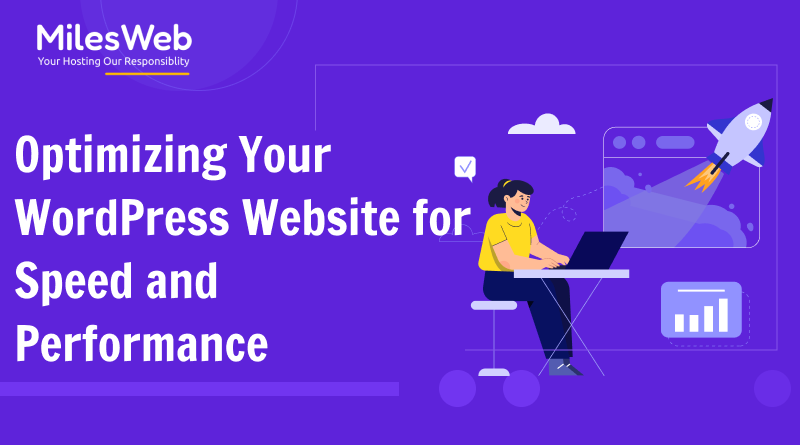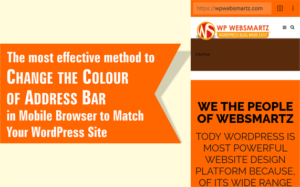Have you noticed a common thing that helps high-ranking websites stand out from the rest? A better user experience. It shows how website speed and performance are crucial for any online website. Any website that takes too long to load can result in increased bounce rates, poor user engagement, and ultimately a drop in conversion rate.
Your search engine position and user engagement are not drastically harmed by having a high bounce rate alone; however, it does highlight the areas where your website’s design and navigation need to be improved to offer better user engagement.
WordPress website speed and performance optimization starts with purchasing the right WordPress hosting cPanel solution. MilesWeb offers the best managed hosting for WordPress plans, specially crafted for faster page loads, improved security, flawless performance, and guaranteed uptime.
Give this blog a read if you want to learn how to elevate your WordPress website by optimizing speed and performance.
Why should you care about website speed?
Before the year 2000, people were largely habituated to long-form content such as books, conventional TV, and newspapers. Their attention span was long, close to 12 seconds. But this being said, in 2015, according to Microsoft’s study, it was found that, over the past two decades, the average attention span of people has decreased substantially, and today it is approximately 8.25 seconds.
This drop is due to the increased shift towards digital devices and the availability of on-demand content.
What does this mean? It indicates that you have a very limited time span to attract and engage more visitors. A delay of just one second in website load time can result in a 7% decrease in conversion rates, an 11% drop in page views, and lower customer satisfaction by around 16%.
Other than that, different search engines like Google have already started to penalize slow-loading websites and rank them lower on the search engine result pages, decreasing organic traffic.
What is the key takeaway? Make your WordPress website fast so that you can drive more traffic, conversions, and sales.
Factors that drag down your WordPress website speed
- Web Hosting Solution
- WordPress Website Configuration
- Size of the Web Page
- Bad WordPress Plugins
- Third-Party Scripts
Simple methods to speed up WordPress performance
For non-tech-savvy beginners, modifying website settings might sound overwhelming. But, despite that, you can still tackle it. If you are not confident enough to handle any technical improvements to your website on your own, then follow the tips below:
- Speed optimization tips for WordPress websites
- Use WordPress Caching Plugin
WordPress pages are built dynamically, i.e., whenever someone visits a particular page on your website or a blog post, the pages are generated in real-time. To display these pages to your visitors, WordPress needs to fetch all the required data and information and put all these elements together.
If this process contains numerous steps, it can slow down the speed of your website when several people visit your website at once. For this reason, it is recommended to integrate a caching plugin into your WordPress website. It will make your website 2 to 5 times faster.
- Optimize Images
Adding high-quality and well-optimized images to your website can help bring your content to life and also increase user engagement. Studies have revealed that visually appealing and colorful images improve readership by around 80%.
Despite everything, if your pages contain non-optimized images, then they could be damaging for your website. They can be the most common reason for slowing down your websites.
Therefore, optimize them for the web.
- Optimize WordPress Database
When your WordPress website starts to grow, the databases tend to fill up with outdated or redundant information. It could also affect your website’s performance. Hence, it is recommended to optimize your website to discard all the unwanted information. The WP-Sweep plugin or the WP-Optimize plugin is best for this.
- Performance optimization tips for WordPress websites
- Regularly Update Your WordPress Website
WordPress is frequently updated, and every update offers new features, bug fixes, and security updates. WordPress themes and plugins that you use for your website also require timely updates.
So, if you manage your WordPress website, then keep your WordPress website, themes, and plugins up to date with the latest versions. If you continue using outdated versions of themes and plugins, it might make your website slow and untrustworthy. It can also become vulnerable to different cyber threats.
- Streamline Background Operations
Daily or on-demand backups and different cron jobs make up background processes in WordPress. These are called background processes because they’re scheduled tasks that run in the background of your WordPress website. These tasks can slow down your website because they involve excessive crawling by search engines. So, make sure that these plugins work only when there is low traffic on your website, and also adjust the frequency of your backups.
- Use CDN (Content Delivery Network)
As you know, the location of your data center plays an important role in influencing the speed of your website. A content delivery network can increase page loading time for all visitors, irrespective of their geographical location. A CDN is a network of servers located in different regions around the world, developed to efficiently deliver your web content. Every server has a copy of your website’s static files. And whenever a visitor visits your website, these files are then delivered to them from a server that is closest to them.
Conclusion
That’s all! We hope our blog helped you understand how to optimize your WordPress website’s speed and performance. Feel free to test these methods out. Don’t forget to measure your website speed before and after applying these best practices. You’ll be surprised to see that these simple changes can increase your WordPress performance.





